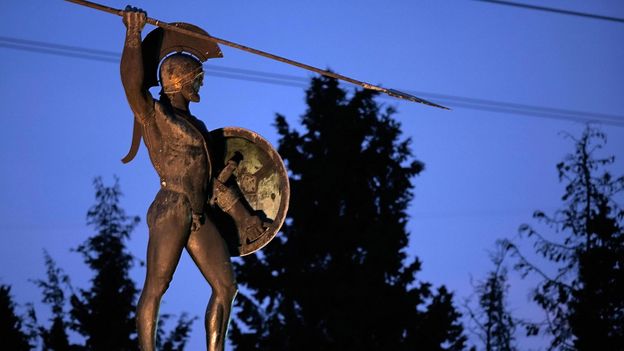By Stav DimitropoulosFeature Matching

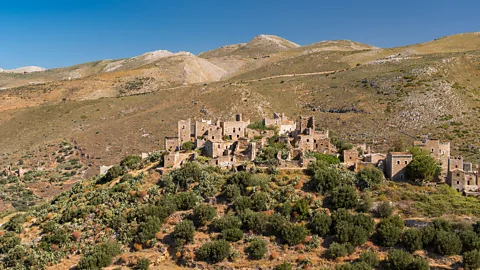 Robert George Young/Getty Images
Robert George Young/Getty ImagesLong isolated from the rest of Greece, the Mani peninsula is home to a clan community that claims a warrior heritage.
The jagged, rocky cliffs of the Mani Peninsula jut out from the Peloponnese on the southern tip of mainland Greece, forcing the landscape to heave and swell like ocean waves. From the craggy peaks, stone houses resembling small castles stand with their backs to the colossal Taygetos Mountains and overlook the stoic Ionian Sea.
This is the country of the Maniots, a clan community believed to be descended from the Spartans, the legendary warriors of ancient Greece.

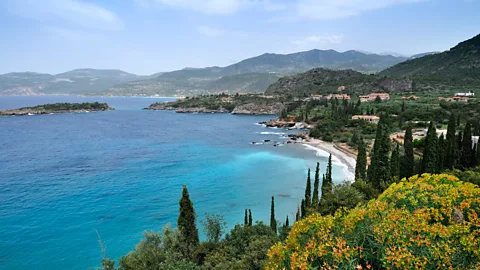 HowardOates/Getty Images
HowardOates/Getty ImagesYou might also be interested in:
• The Mystery Behind Greek Temples
“Here’s your lalaggi” said Giorgos Oikonomeas as he handed me a strip of crispy dough fried in extra virgin olive oil. He had the build of a warrior – sturdy and broad-shouldered – but his wrinkled face was warm and relaxed .
Oikonomeas grew up in the village of Neochori, on the northwest coast of the Mani Peninsula, and never left. He spent his life leading a caféneio (a traditional Greek cafe); Now retired, he no longer serves customers, but spends his mornings at the kafeneio exchanging news about his family and sometimes politics with his friends.
As my teeth sank into the crisp flesh of the lalaggi, the paste melting on my tongue, Oikonomeas explained to me that I was enjoying a snack that was likely eaten thousands of years ago by the infamous Greek soldiers. “Lelegas, the first king of Sparta, was probably the first to make them,” he told me.
“If you want a taste of what life would have been like in ancient Sparta, look no further,” he said. “We’re as Spartan as possible.”

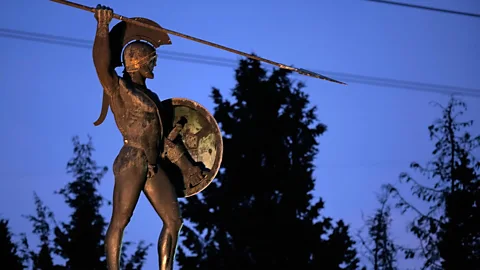 STRINGER/Getty Images
STRINGER/Getty ImagesNearly three millennia ago, when ancient Greece was composed of “polises,” or individual city-states, much of the Peloponnese belonged to ancient Sparta and its allies. Unlike the inhabitants of the rival city-state of Athens, who were artists and philosophers, the Spartans were fighters; Boys were said to begin their military training at age seven, challenging each other to physical competitions before becoming full-time soldiers at the age of 20. Women, on the other hand, played no role in the military, but they often received formal education. and were allowed to own property – rights rarely afforded to women in other Greek polis. As a result, Spartan women were known for their independence.
After defeating Athens in the Peloponnesian War, Sparta reached the height of its power in the 5th century BC. But its rule was short-lived: in 371 BC, the Spartans were defeated by soldiers from the city-state of Thebes, triggering the fall of Sparta. But the Spartans living on the Mani Peninsula, sheltered from the rest of the Peloponnese by the Taygetos Mountains, held on, defending their territory for centuries against the Thebans, then against Ottoman, Egyptian, and French forces, among others. The Maniots, as they were called, were just as treacherous at sea as on land, engaging in petty piracy and frequently traveling to other coastal nations as mercenaries. They were known to be so ruthless that many conquerors simply avoided them.

 Robert George Young/Getty Images
Robert George Young/Getty ImagesThe region remained autonomous until the mid-to-late 19th century, when the Greek government reduced the peninsula’s autonomy. But it was not until the 1970s, when the construction of new roads opened the peninsula to the rest of the Peloponnese, that the Maniots began to welcome new arrivals.
The Maniots’ affinity for conflict was not limited to outsiders. When it was an autonomous region, the peninsula was ruled by different families, or clans; As these clans struggled for power, violent vendettas broke out and could last for years. “If a member of another family shamed one of yours, a family roundtable was held to decide the severity of the punishment,” Oikonomeas explained. “The punishment was inflicted on the entire clan and not just the attacker. Such was Maniot’s feeling of pride. He noted that until recently, Maniots referred to their sons as “guns” and their daughters as “barrels of powder at the foundations of their house.”
The Maniots now devote their lives to more peaceful activities such as olive cultivation. The region is known for its fruity, full-bodied olive oil with a luscious golden-green hue; it’s used for everything from flavoring cheese to dressing anchovies to frying lalaggi.

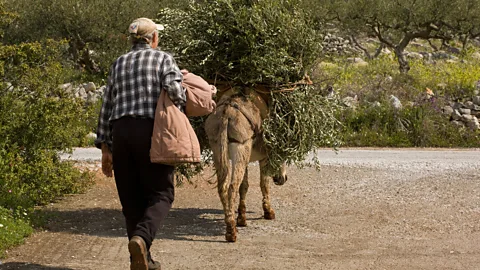 Bob Gibbons/Alamy
Bob Gibbons/AlamyHowever, the region’s fierce past is not forgotten. The ancient Spartan maxim “ι tan i epi tas”, a phrase first uttered by Gorgo, wife of Spartan King Leonidas, before the king took a stand against invading Persian troops at the Battle of Thermopylae in 480 BC, can be heard regularly. The saying translates to “with the shield or on the shield” – a reminder that there are only two ways to return home from war: either carry your shield as a victor, or be carried on it as a victim . The adage is still commonly used today, both as a vote of strength and as a warning.
This is not the only reminder. Almost everyone who was born and raised on the Mani Peninsula will tell you that they have Spartan blood in their veins.
“The Maniots are descended from the ancient Spartans, period,” Oikonomeas said.

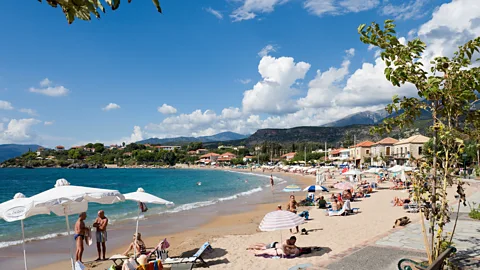
At 86, Oikonomeas still remembers his mother putting hard-boiled eggs in his mouth to make him stronger, insisting that as the only boy, it was up to him to carry on the family legacy. And he remembers seeing his aunts gathering the day before the family funeral to recite mourning songs at hair-raising frequencies, a ritual mentioned in Homer’s Odyssey.
But there is no solid scientific evidence proving a direct link between today’s Maniots and the ancient Spartans. Any trace of authentic Spartan DNA is long gone; all that remains of the warriors are their legends. Some historians and anthropologists argue that similarities between ancient and modern rituals – such as mourning songs – are strong indicators of a relationship between ancient Spartans and modern Maniots, but Basil C Gounarisprofessor of modern history at the Aristotle University of Thessaloniki, disagrees.
“Natural anthropology and history are not aligned,” Gounaris said. “Living in the same natural environment obviously led settlers to make similar choices on many issues. But it has nothing to do with the DNA of the inhabitants.”

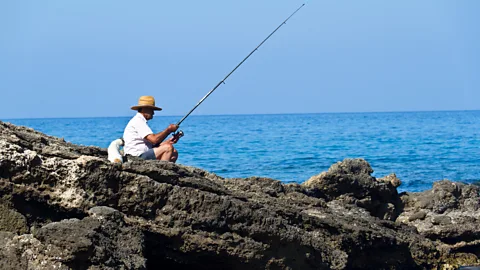 Gary B/Alamy
Gary B/AlamySunburned crowds poured into the kafeneio as Oikonomeas sipped his coffee, casually watching the establishment’s new owner try to keep up with the growing number of customers. The kafeneio is small, but its prime position directly opposite Neochori’s main square means it is almost always busy. Around ten square wooden tables have been squeezed into this small space, while the clatter of crockery and the sound of espresso machines ensure that there is never silence.
“I spoke with a professor who disputed your claims about an unbroken lineage of ancient Spartans,” I told him, wiping the fried pastry crumbs from my fingers.
Unfazed, Oikonomeas passed me another lalaggi. “’ι tan i epi tas’, you can tell him.”
Join over three million BBC Travel fans by liking us on Facebookor follow us on Twitter And Instagram.
If you liked this story, sign up to the weekly bbc.com features newsletter titled “If you only read 6 things this week”. A hand-picked selection of stories from BBC Future, Earth, Culture, Capital and Travel, delivered to your inbox every Friday.


